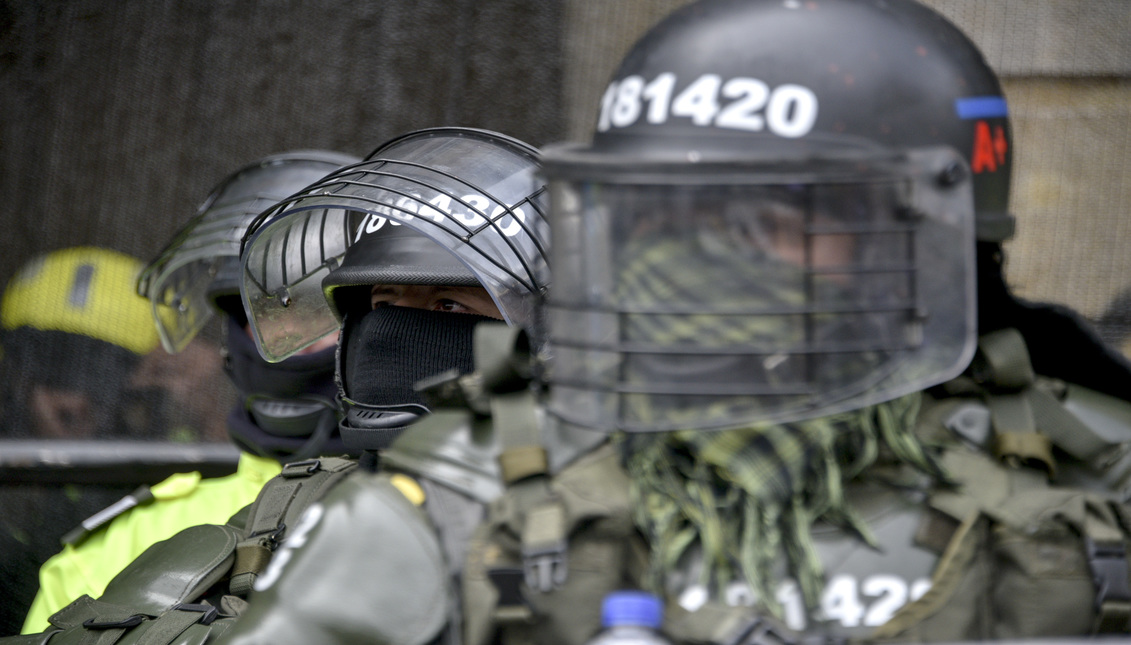
Abuses of mobile anti-riot squad and call for political control debate in Colombia
Denouncements of human rights violations during the National Strike in Colombia are growing while dialogues between the government and the strike committee…
Three weeks have passed since the beginning of the national strike in Colombia and its dynamics and rhythms have been changing. The very numerous daily demonstrations have given way to more concentrations of smaller size in symbolic points of the city and, more spaced in time, multitudinous marches.
An example of the former is the sit-in held on Dec. 11 in the vicinity of the National Centre of Historical Memory to request the resignation of the director, Rubén Darío Acevedo, who has denied the existence of an armed conflict in Colombia and has recently been denounced for censorship by the institution he is head of.
An example of the latter is the colossal street concert #UnCantoxColombia held on Dec. 8 in several cities throughout the country. In Bogotá, three fixed platforms and one mobile platform were organized, which from 8 a.m. to 2 p.m. was accompanied by thousands of people through one of the city's main roads.
Although numerous citizen mobilizations have been adequately accompanied by the National Police, there are more and more alarming reports of human rights violations committed by members of the Mobile Anti-Riot Squadron (ESMAD, by its acronym in Spanish).
On Nov. 23, in a large mobilization that was dispersed by the ESMAD, Dylan Cruz was shot with a bean bag ammunition that led to his death, which is why it was classified by legal medicine as a homicide. This day seems to have marked a change in ESMAD's strategy, since it has not become visible in the largest demonstrations since then.
RELATED CONTENT
On the contrary, ESMAD and the police have reached smaller concentrations, carried out irregular arrests, violence against journalists, obstructed the work of human rights agents and the media, and have launched tear gas or stun bombs, even in semi-empty streets or parks where neighbors congregate.
The most alarming of the cases reported occurred on Tuesday night, Dec. 10, in Bogotá, and consisted of the irregular arrest of a woman, who was then transported in a private vehicle, without any police markings, even though the records showed that it was the property of the official entity. Since it was not a car adapted to transfer detained people, the woman was able to lower the window and shout for help. A couple who witnessed the scene followed the car while filming, and after a few blocks, managed to close them off, which caused those who were holding her to release her.
The event has raised enormous concerns because this same procedure was used in cases of forced disappearance in the 1980s that have been adjudicated to the Colombian State.
On the specific case of Dec. 10, Major General Hoover Penilla, commander of the Bogotá Police, stated that, despite the fact that the vehicle had no mark on it, the officials acted according to their duty, since the woman was blocking public roads.
Several representatives to the Senate House cited the Minister of Defense, Mr. Carlos Holmes Trujillo, the Minister of the Interior, Ms. Nancy Patricia Gutiérrez, the Director of the National Protection Unit, Mr. Pablo Elías González Mongul, the Commander of the Colombian National Army, General Nicacio de Jesús Martínez Espinel and the Director of the National Police, Major General Óscar Atehortúa Duque for a political control debate.
The debate, held on Dece. 11, is the beginning of the discussion on one of the demands made by the National Strike Committee: the dismantling of the ESMAD. If the conclusion is that the state should have a specialized entity to regulate violent demonstrations or if, on the contrary, the existence of such entity tends to violate more rights than it protects, and consequently must be dismantled, is something that remains to be seen.










LEAVE A COMMENT: